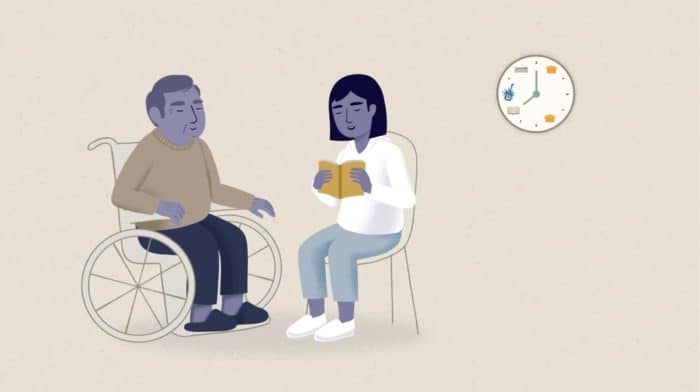How To Prevent Caregiver Burnout
Caring for someone can certainly be rewarding, but it can also be stressful. Nearly half of all family caregivers say they are “somewhat stressed,” and more than a third are “highly stressed”. Being a caregiver can bring out all kinds of emotions. It’s a demanding job, and sometimes caregivers get so wrapped up in their duties that they start to neglect their own health and well being. In this video, we’ll teach you how to recognize some of the signs of caregiver burnout and give you a few tips on what you can do to prevent it.
Being a caregiver can bring out all kinds of emotions. One day it may be rewarding and fun, while the next it might be stressful and draining.
It’s a demanding job, and sometimes caregivers get so wrapped up in their duties that they start to neglect their own health and wellbeing.
In this video, we’ll teach you how to recognize some of the signs of caregiver burnout and give you a few tips on what you can do to prevent it.
On the best days, caregiving is empowering; it brings you closer to the person you’re caring for and provides you with a sense of purpose and inner strength.
However, it’s just as likely that being a caregiver will cause you to experience negative feelings. You might even feel several emotions at once; scared about the future, angry about your situation, frustrated about your limitations, and anxious about all the things you need to do.
The good news is, these feelings are all perfectly normal. The important thing is to recognize when they’re happening and deal with them appropriately before they lead to a bigger problem, like caregiver burnout.
So, how can you tell whether what you’re feeling is burnout or just normal exhaustion? Here are some of the symptoms to look for:
You feel a strong urge to run and hide from your responsibility.
Your activity becomes scattered and frantic.
You often feel angry and irritable.
You have a hard time concentrating, and can’t read more than three sentences at a time without losing focus.
You often lose track of important details.
You sleep less than three hours at a time or lose more than ten pounds.
Everyone gets exhausted once in a while, but it’s the intensity and frequency of these symptoms that separate a normal reaction from burnout. If any of these symptoms describe how you feel most of the time, you should seek help from your family doctor as soon as possible.
The best way to prevent burnout is to deal with your emotions as they come up. If you start to feel stressed, angry, guilty or depressed, take a moment to stop and think about why you’re feeling this way, acknowledge the source, and try to move past it.
Open yourself up to creating a give-and-take (alt/ help exchange for translation) relationship with the person you’re caring for; they may have as much to offer you as you have to offer them. You’re both in this situation together, trying to do the best you can with the knowledge and skills you have. Don’t expect the person you’re caring for to change their entire personality, but aim to find some common ground and work as a team.
If you start to feel overwhelmed, try using one of the following techniques to help calm yourself down and ground you:
Take a couple of long, deep breaths, breathing in through your nose and out through your mouth.
Count slowly down from 10..
Trace your eyes along a vertical line from the ceiling down to the floor, breathing out while you do so.
Put on music by one of your favourite artists.
Get some exercise. Any physical activity can help, whether it’s stretching, playing sports, or just going for a brisk walk around the block.
If you think you’re starting to feel burned out, don’t be afraid to ask for help. Isolating yourself when things get tough will only make your negative emotions get worse. Your friends and family want to help, but they won’t know you need it unless you ask.
You can’t expect to provide proper care for someone else if you don’t also take care of yourself. Being able to recognize the signs of caregiver burnout will help you take steps to avoid it, and allow you to provide the best care possible on both the good days and bad.
Be sure to subscribe and watch our other videos for additional caregiver support and resources.
Greek: https://youtu.be/9x32_JKBgtQ
Urdu: https://youtu.be/ZCU3FBosROo
Bengali: https://youtu.be/bgFGRIlbGfo
Chinese: https://youtu.be/i77X_d29bMY






